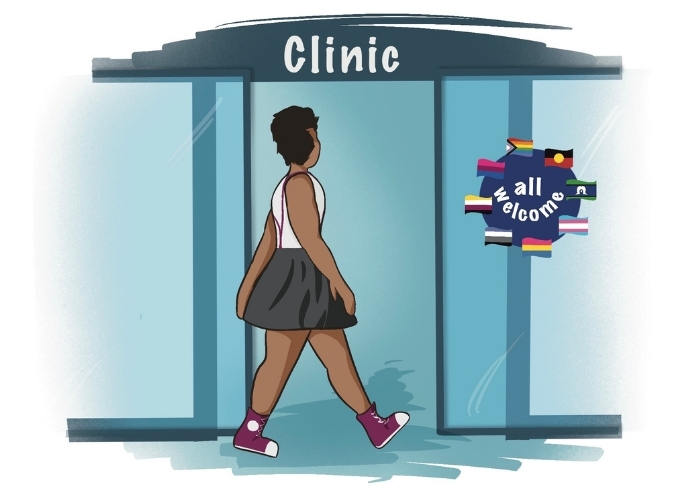Sexually transmitted infections and blood-borne viruses: Information for trans, gender diverse and non-binary people
This is a resource for trans, gender diverse and non-binary people to improve their awareness and understanding of sexually transmitted infections (STIs) and blood-borne viruses (BBVs).
It is important that everyone has access to accurate and relevant health information. We use non-gendered medical terms to describe body parts and sexual activity, so it is clear what we are referring to.
You can download the brochure as a pdf or read the full text below.
Contents
— What are STIs and BBVs?
— How do I know if I have an STI or BBV?
— Testing for STIs and BBVs
— How are STIs and BBVs treated?
— Reducing your risk of STIs and BBVs
— Know your rights
What are STIs and BBVs?
STIs and BBVs are infections that can affect everyone. Some are cured by themselves, some need medicine to be cured and some will stay with a person for the rest of their life.
STIs are passed on through unprotected vaginal, anal and oral sex with someone who has an STI.
STIs are usually passed on through:
- Semen
- Anal fluids
- Vaginal fluids
- Genital skin contact
STIs include:
- Chlamydia
- Gonorrhoea
- Syphilis
- Genital warts
- Genital herpes
BBVs are viruses that are passed on through blood-to-blood contact, including sharing or reusing needles and other injecting, tattooing and piercing equipment. They include:
- HIV
- Hepatitis B
- Hepatitis C
HIV and hepatitis B can also be passed on through unprotected sex.

How do I know if I have an STI or BBV?
Most STIs and BBVs have no obvious symptoms, so you and your partner/s may have one without knowing it. The only way to know is to get tested regularly.
STIs can sometimes show the following symptoms:
- discharge from the genitals
- pain when peeing
- pain during sex
- unusual sores lumps rashes
- unusual bleeding patterns
Sometimes symptoms go away by themselves, but if left untreated, the infection can stay in your body and cause harm.
BBVs sometimes cause symptoms, including loss of appetite, nausea and fever.
Testing for STIs and BBVs
You deserve to be treated with respect when you get tested, so it is important you find a health professional you trust and feel comfortable with.
You will be asked questions about your sex life and other activities to find out which tests may be appropriate for you. Some questions you might be asked include:
- Medication history (including hormones)
- Sexual history and previous STI BBV testing
- BBV risk history e.g. injecting, tattooing, piercing

Testing may involve a urine sample, blood sample and swabs from the vagina, penis, throat and or anus. The samples can be self-collected in private if you prefer. A routine test without symptoms does not require a physical exam.
You can fill out the Sexual Safety Quiz to help you understand more about your testing needs. If it makes you feel more comfortable, you can take a copy of your quiz results to your appointment.
How are STIs and BBVs treated?
Chlamydia, gonorrhoea and syphilis can be cured with antibiotics if they are detected early.
Viruses such as genital herpes, genital warts, HIV and hepatitis B can be treated with medication to effectively manage any symptoms. Hepatitis C can be cured with effective medication.
Reducing your risk of STIs and BBVs
While testing is an important part of managing STIs and BBVs, here are some other methods you can use to reduce your risk:
Communication
Talk about sexual health with your partner s so everyone can make informed choices.
Barrier methods
Condoms can prevent STIs, BBVs and unplanned pregnancy. Dams can also prevent STIs during oral sex.

HIV prevention
- You can protect yourself against HIV by taking pre-exposure prophylaxis (PrEP) every day.
- Effective HIV treatments are available to prevent people with HIV from passing it on to others through sex (undetectable = untransmissible).
- If you think you have come into contact with HIV, post-exposure prophylaxis (PEP) can help protect you if you take it within three days.
Vaccination
Vaccines are available to protect against hepatitis B and some strains of HPV that can cause genital warts and cervical cancer.
Needle safety
- Avoid sharing or reusing injecting equipment.
- You can get sterile needles through a needle and syringe program.
- Check out healthywa.wa.gov.au/NSPWA.
- Only visit tattoo and piercing places with high safety standards.
Know your rights
Health professionals have a responsibility to educate themselves about the diverse needs of trans, gender diverse and non-binary people.
It is important that you understand your rights so you can receive the high-quality care you deserve.
- Every service needs to respect your privacy and confidentiality.
- You can bring someone with you for support.
- You are allowed to assert your name, pronouns and gender.
- You can ask your health professional to use certain words when talking about body parts.
- You can ask questions if you are unsure about your care.
- You have a right to be treated with dignity and respect.
- If you are unhappy with the quality of service, you are allowed to stop the appointment and leave. To make a complaint, visit ahpra.gov.au.

Check out embraceu.shq.org.au for some great resources!
- Find useful links to inclusive organisations and services.
- Take our online quiz to find out how often you should get tested for STIs/BBVs.
- Feel uncomfortable talking to a health professional? Our letter template may help.
- Watch an inclusive clinic consult video.
- Unsure about certain words? Read our inclusive language guide.
Related Resources
Letter template for health appointments
Downloads, Medical

Testing information for health professionals
Medical, Professionals

